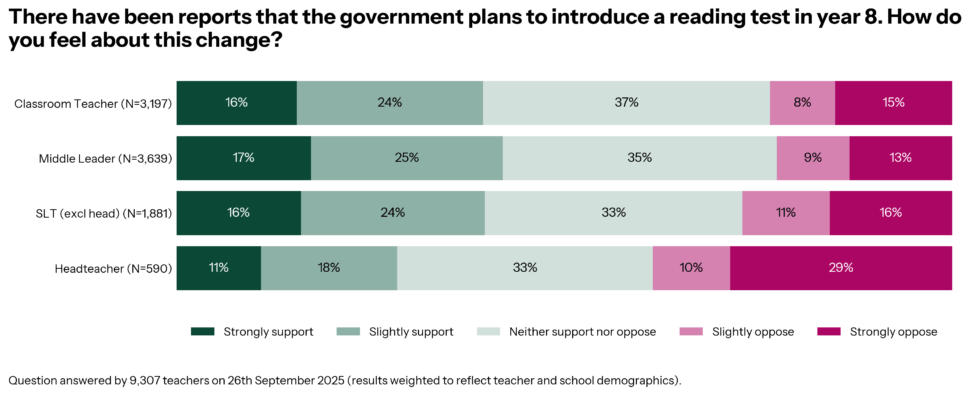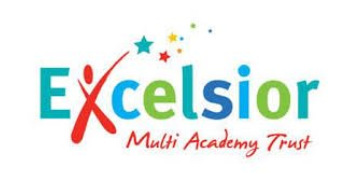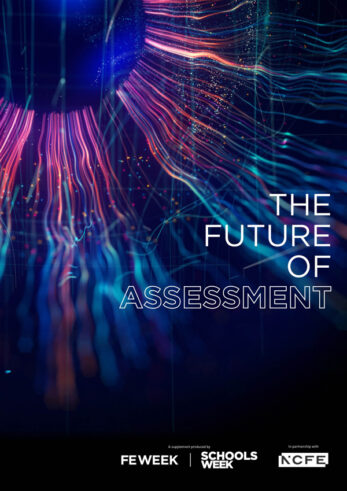More teachers back government plans for a mandatory reading test in year 8 than oppose it – but leaders are more sceptical, new polling shows.
It would be the first statutory test in key stage 3 since SATs for year 9s were scrapped in 2008.
The policy has been prompted by concerns that poor reading is holding pupils back from accessing the curriculum in other subjects at secondary school.
A Teacher Tapp poll has found 16 per cent would “strongly support” the introduction of such a test, with a further 24 per cent “slightly” supporting the policy.
Thirty-six per cent said they neither supported nor opposed it. Nine per cent slightly opposed it, while 15 per cent were strongly opposed.
Under the plans, the test results would be available to the government and Ofsted, but would only be published at a national level – similar to the year 1 phonics check.
They would not be used to trigger intervention in schools, sources said.
Phillipson defends plans
But Teacher Tapp found headteachers were more likely to oppose a year 8 reading test (39 per cent) than other senior leaders (27 per cent), middle leaders (22 per cent) and classroom teachers (23 per cent).

The pollster said this showed “fears that a new test would be used as a school accountability measure”, something unions have also raised.
But speaking at the Labour Party conference at the weekend, Bridget Phillipson, the education secretary, defended the proposal.
“It is important, particularly for working-class kids, that we have a sense not just of where they are but where we need to step in and put more support in place…”
“Of course, I want to make sure that our staff are well supported, but my number one priority is making sure that all children leave school well prepared for the world to come.”
Reactions from school leaders have been mixed. The ASCL leaders’ union has said if “done well”, the test “could be helpful”, but warned school leaders “may well be uneasy about what future governments might do”.
The NAHT union, on the other hand, has said the test would be “unnecessary, distracting and not a good use of money”.
‘We didn’t teach them to read. That’s on all of us’
Dan Morrow, the chief executive of the Cornwall Education Learning Trust, told the Labour conference he was “in favour” of the tests.
“Most of our children are sitting reading tests, left, right and centre, and we’re paying a lot of money for them.
“My worry about the check is that we react professionally, as sometimes we do, which is we teach to a test…That’s on us, frankly, because that’s not what the check is.
“As a primary leader, I would say this very honestly, sometimes we nurture and hold our primary children so well, then we say, ‘oh, but what happens when we get to secondary?’

“What happens is we didn’t teach them to read, and so they can’t actually access that curriculum. And that’s probably not the secondary leaders. That’s on all of us.”
Annamarie Hassall, the chief executive of the National Association for Special Educational Needs, told the same panel event at the conference that the idea of year 8 checks had come up in her discussions with the government’s curriculum and assessment review.
“We did talk about measurements, and one of our proposed measurements was reading. We have a worry that sometimes there’s a view that reading is the job of primary phase, and in secondary that job should have been done elsewhere.”
Different approaches to progress testing
Teacher Tapp’s polling shows schools take different approaches to internal testing during key stages 2 and 3.
Asked how they currently assessed whether pupils in their subject were on track at the end of key stage 3, 59 per cent said they used end of topic tests they wrote themselves, while 37 per cent said they relied on teachers’ judgment.
Just 11 per cent said they bought in tests.
But asked for the primary method they used to check reading progress during key stage 2, 43 per cent said they used standardised tests from external providers, while 27 per cent said they used past SATs papers and 24 per cent said their school provided its own tests.














Your thoughts